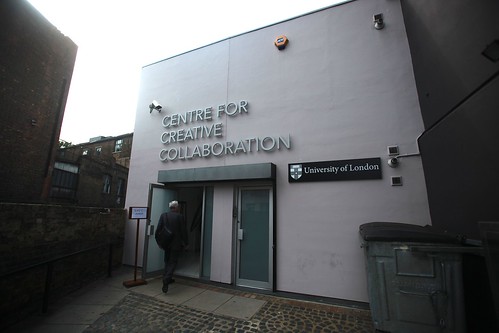
On my recent two posts on bringing the idea of skunkworks to local government, several people made the extremely reasonable point that I probably wasn’t really talking about skunkworks at all.
Steph said in the comments:
…it seems to me that we’re at risk of hanging more onto the ‘skunkworks’ peg than it’s fair to ask it to carry. To me, skunkworks is about a team delivering a tangible technical output quickly and creatively because they’ve been relieved, to a great extent, of bureaucracy and management.
I hold my hands up to this!
My time spent with Lloyd on Saturday reminded me of the really interesting work he is doing with Brian Condon and others at the Centre for Creative Collaboration in Kings Cross.
Perhaps this is a better model than a skunkworks for helping local councils improve and innovate?
Creative collaboration is all about the idea that if you put interesting people in a room together, magic starts to happen. We saw that in abundance on Saturday at GovCamp.
As the site for the Centre says, it is:
A neutral place where people from many different backgrounds – universities, large corporates, SMEs, freelancers – can work together on new things in the belief that real innovation happens at the edge and in the gaps between disciplines.
I suspect this is the sort of thing I was thinking about. I think there are two elements here for councils – the purely internal, and then opening up a bit to outside ideas.
Firstly, perhaps a local authority should have its own ‘centre for creative collaboration’ where innovative, idea-laden people work together, no matter what their role or duties. In other words, allow the networkers, the collaborators and the innovators to leave their desks and put them next to each other to create wonderful things.
This isn’t the same as a skunkworks, because these guys are still doing their day jobs – just in a different environment, where connections and collaborations can flourish, organisational boundaries be leapt over and ideas generated.
The second stage is then to open the conversation up to others, probably in a neutral space, rather than in a council building. Maybe this is something that empty shops on high streets could be used for? Just arrange Tuttle or Jelly like meetups, allowing people to hang out and talk about their work and ideas. Start off informally and see where the conversations and ideas go.
If similar initiatives are happening in places across the country, then sharing experience should be fairly easy to do through online networks.
I’d be interested in people’s thoughts!
Photo credit: Benjamin Ellis.

